

SUBSCRIBE TO OUR FREE NEWSLETTER
Daily news & progressive opinion—funded by the people, not the corporations—delivered straight to your inbox.
5
#000000
#FFFFFF
To donate by check, phone, or other method, see our More Ways to Give page.


Daily news & progressive opinion—funded by the people, not the corporations—delivered straight to your inbox.
On 20 September, at the request of the young people who have been staging school strikes around the world, we're walking out of our workplaces and homes to spend the day demanding action on the climate crisis, the greatest existential threat that all of us face. It's a one-day climate strike, if you will - and it will not be the last. This is going to be the beginning of a week of action all over the world. And we hope to make it a turning point in history.
We hope to make it a turning point in history.
We hope others will join us: that people will leave their offices, their farms, their factories; that candidates will step off the campaign trail and football stars will leave the pitch; that movie actors will scrub off their makeup and teachers lay down their chalk; that cooks will close their restaurants and bring meals to protests; that pensioners too will break their daily routines and join together in sending the one message our leaders must hear: day by day, a business as usual approach is destroying the chance for a healthy, safe future on our planet.
We are well aware that, by itself, this strike and a week of international climate action won't change the course of events. The good news is that we have the technologies we need - the price of a solar panel has plunged 90% in the past decade. And we know the policies to make them work: all across the planet some version of a Green New Deal has been proposed, laws that would speedily replace fossil fuels with the power of sun and wind, along the way providing good jobs and stabilising strong local economies. We salute the people - many of them young - working hard to pass those measures against the entrenched opposition of the fossil fuel industry.
The September day of global action is designed to support those people. We hope all kinds of environmental, public health, social justice and development groups will join in, but our greatest hope is simply to show that those working on this crisis have the backing of millions of human beings who harbour a growing dread about our environmental plight but who have so far stayed mostly on the sidelines. It may take a few attempts to get those kind of numbers in the streets, but we don't have too long: our window for effective climate action is closing fast.
We know not everyone can join us. On a grossly unequal planet, some people literally can't do without a single day's pay, or they work for bosses who would fire them if they dared try. And some jobs simply can't stop: emergency room doctors should keep at their tasks. But many of us can put off for 24 hours our usual day to day routine, confident it will be there when we return. We hope some people will spend the day in protest: against new pipelines, or the banks that fund them; against the oil companies and the politicians that spread their lies. We hope others will spend the day putting insulation in the walls of their neighbours' homes, or building cycle paths. We hope everyone will take at least a few minutes in a city park or a farm field or on the roof of their apartment to simply soak in the beauty of the world it's our privilege to protect.
Obviously this is a lot to ask. A day in the life of the world is a big deal, and all of us are used to our routines. But we're not comfortable letting schoolchildren carry all the weight here - they need our backing. And disrupting our normal lives seems key - it's normal life that is doing us in, the fact that we rise each morning and do pretty much the same things we did the day before, even amid an unfolding crisis.
We are the people who happen to be alive at the moment when our choices will determine the future for tens of thousands of years: how high the seas will rise, how far the deserts will spread, how fast the forests will burn. Part of our work must be to protect theat future.
Margaret Atwood, Genevieve Azam, Tom Ballard, Fadel Barro, Nnimmo Bassey, May Boeve, Patrick Bond, Mike Brune, Nicola Bullard, Sharan Burrow, Valerie Cabanes, Rachel Carmona, Dr Craig Challen, Noam Chomsky, Maxime Combes, Thomas Coutrot, Cyril Dion, Tasneem Essop, Christiana Figueres, Prof Tim Flannery, Nancy Fraser, KC Golden, Tom BK Goldtooth, Maggie Gyllenhaal, Dr John Hewson, John Holloway, Prof Lesley Hughes, Tomas Insua, Satvir Kaur, Barbara Kingsolver, Winona LaDuke, Jenni Laiti, Bruno Latour, Annie Leonard, Michael Mann, Gina McCarthy, Heather McGhee, Luca Mercalli, Moema Miranda, Jennifer Morgan, Tadzio Muller, Kumi Naidoo, Mohamed Nasheed, Carlo Petrini, Dr Anne Poelina, Mark Ruffalo, Peter Sarsgaard, Dr Vandana Shiva, Rebecca Solnit, Gus Speth, Prof Will Steffen, Tom Steyer, Chris Taylor, Terry Tempest-Williams, Aurelie Trouve, Farhana Yamin, Lennox Yearwood are signatories to this article
With Democratic candidates for president coming forward and progressives nationwide defining the agenda ahead, this is a good time to look hard at where we are as a country. Abraham Lincoln put it best: "If we could first know where we are... we could better judge what to do and how to do it."
So where are we? There are many ways to judge, but one important way is to compare ourselves to other advanced democracies and see where we stand in the rankings. Let's focus on twenty well-to-do countries, all members of the Organization for Economic Cooperation and Development (OECD). In addition to the U.S., the group includes the fifteen major countries of Western Europe, Japan, Australia, New Zealand, and Canada.
Surely it is time to think clearly about how we arrived at this place, and what it means when huge problems arise and persist across almost the whole spectrum of national life. Now it is time to decide "what to do and how to do it."
Next, we need to know which rankings are important. People have different aspirations for the U.S., as we know all too well. The information presented below seeks to bypass abstractions like the overall economy and look instead at the situation facing actual people. To this end, it looks at U.S. performance in the areas of social welfare and economic security, environment and climate, health and well-being, education, gender rights and women, and democratic governance.
Theses realities deserve our most serious attention and links to all the referenced data are included for further exploration. These measures of our current situation--this "People's State of the Nation" as it were--point to where American efforts must be. Even a few minutes with your head bowed over this material--which shows the U.S. woefully behind our peer countries--should convince you that we have let our national situation deteriorate for far too long. The following statistics show the United States is at the very bottom in treatment of women, treatment of children, environmental performance, and many key measures of social and economic well-being, including poverty, inequality, and longevity. No wonder Americans are frustrated and angry.
We now face a daunting, festering array of challenges that were decades in the making. These are issues that deeply afflict our lives and living, and will require the most determined and sustained policy response if we are to save ourselves and help others abroad facing even more dire prospects.
Many aspects of our national condition cannot be adequately captured in international comparisons, for example the special burdens across almost all issues faced by blacks and other minorities in America. The same is true for many international issues, like troops of some variety on the ground today in an estimated 149 of the world's 195 countries.
If we fail to come together to address these challenges, we will remain mired in desperate needs, split by deep divisions, and endlessly burdened and diverted by the cumulative consequences of global warming.
Surely it is time to think clearly about how we arrived at this place, and what it means when huge problems arise and persist across almost the whole spectrum of national life. Now it is time to decide "what to do and how to do it."
We know what is at stake on individual issues explored below, like the treatment of children. But, on a larger canvas, what is also at stake is the success of our experiment in nationhood. If we fail to come together to address these challenges, we will remain mired in desperate needs, split by deep divisions, and endlessly burdened and diverted by the cumulative consequences of global warming.
A look at the numbers
The United States is a rich nation by conventional measures. "The world's highest standard of living" was once frequently heard. The United States is indeed first in average household income per capita, but we fall to sixth in median household income. Getting closer to the heart of the matter, the U.S. falls to thirteenth on the United Nations' Human Development Index,which looks at education and longevity as well as purchasing power. When we examine the detailed conditions of life and living in America, our sad situation is more fully revealed. In a comparison with nineteen other OECD countries,thought to be our peers, recent studies indicate that the United States now has:
In Economic Well-Being
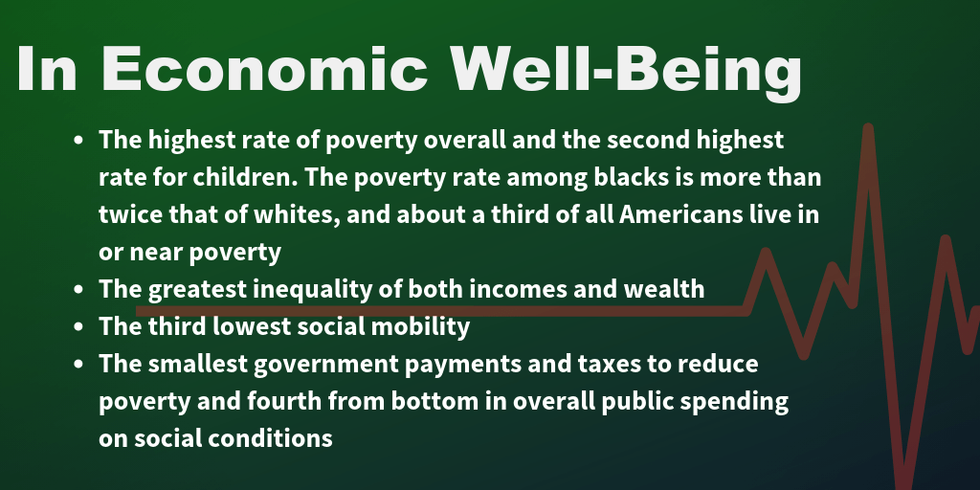
References:
In Gender and Women's Issues
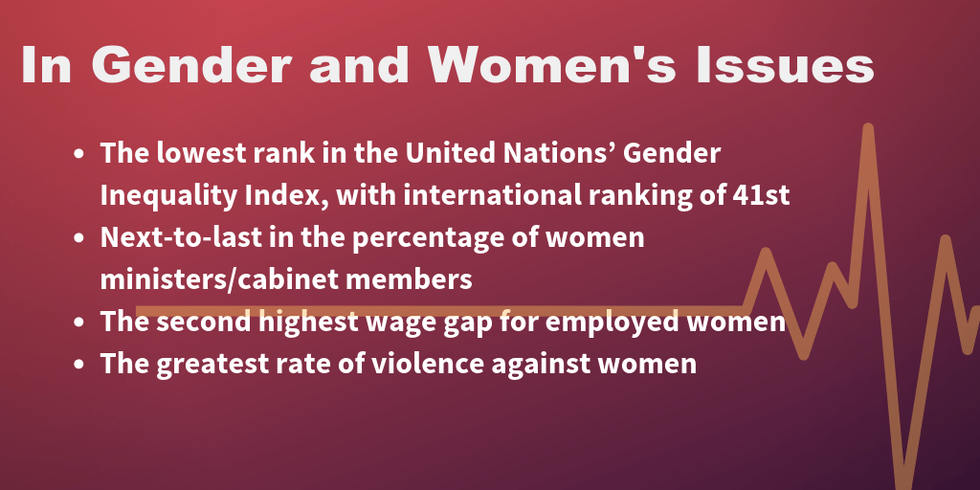
References:
In Social Well-Being
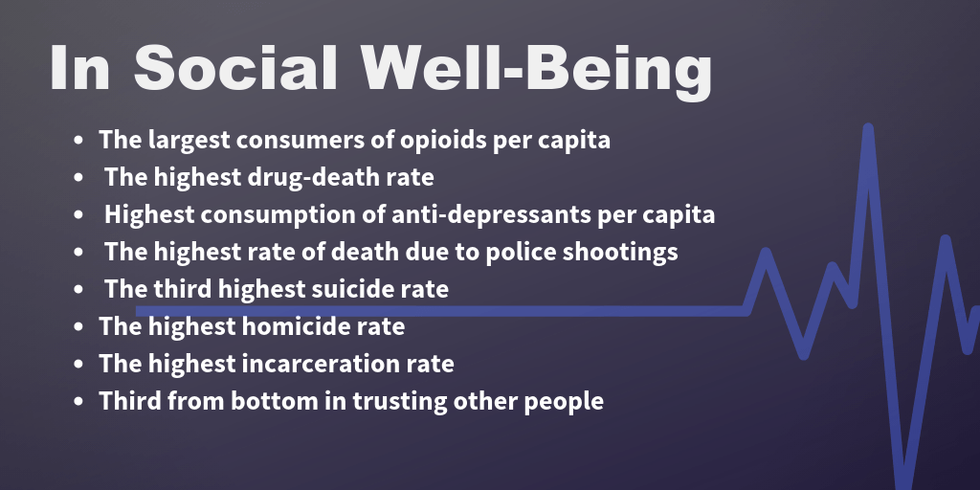
References:
In Environmental Protection
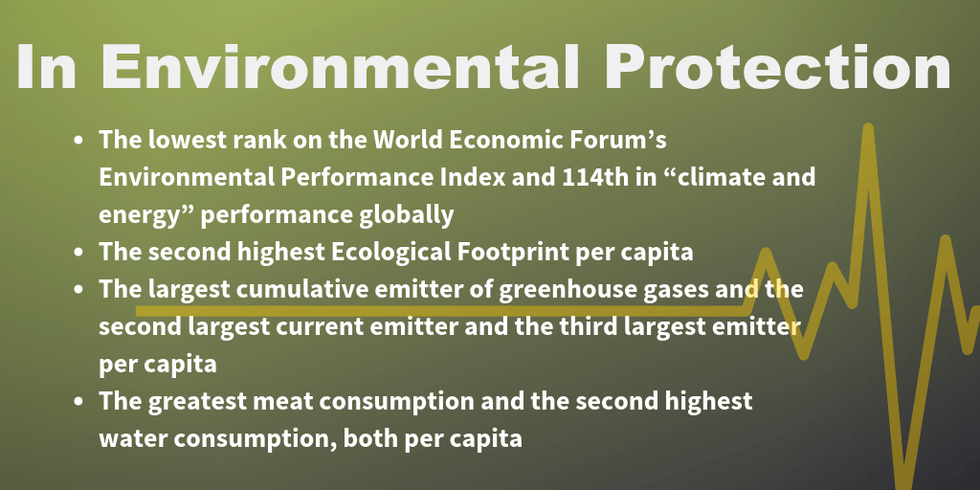
References:
In Child Welfare and Education
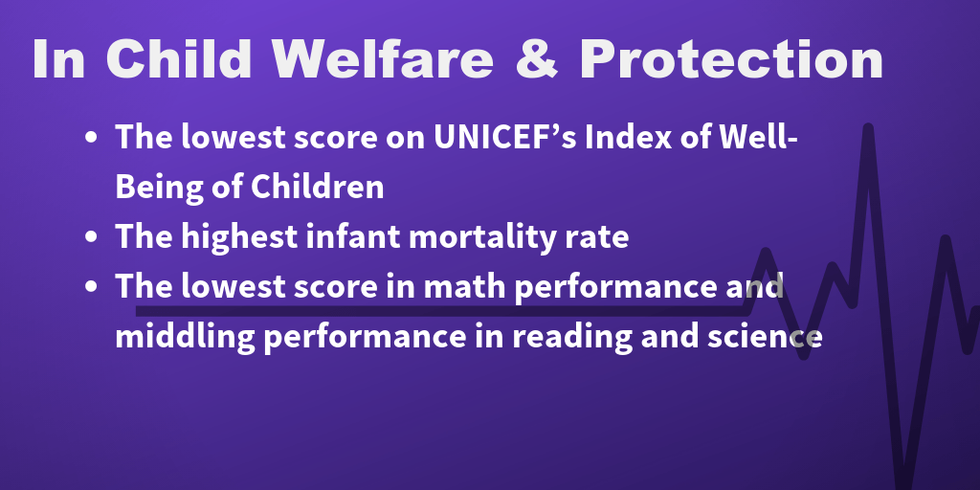
References:
In Health and Health Care
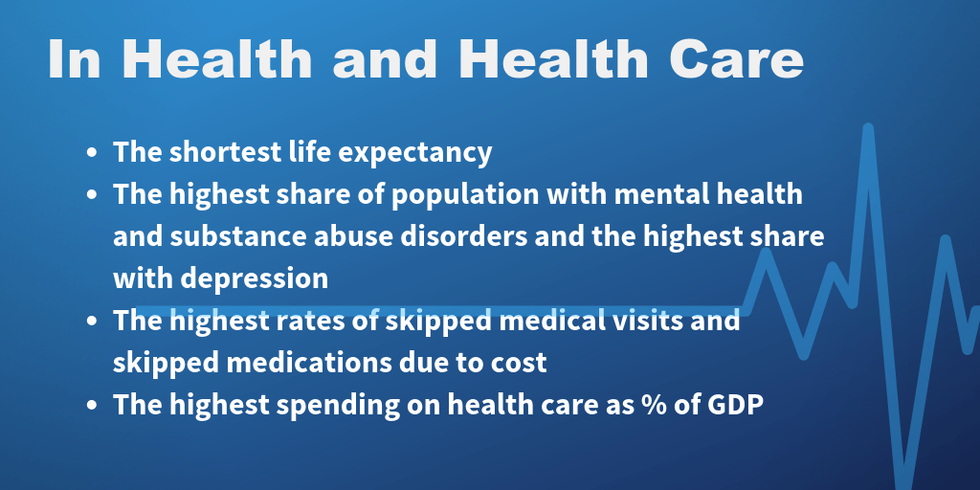
References:
In Governance
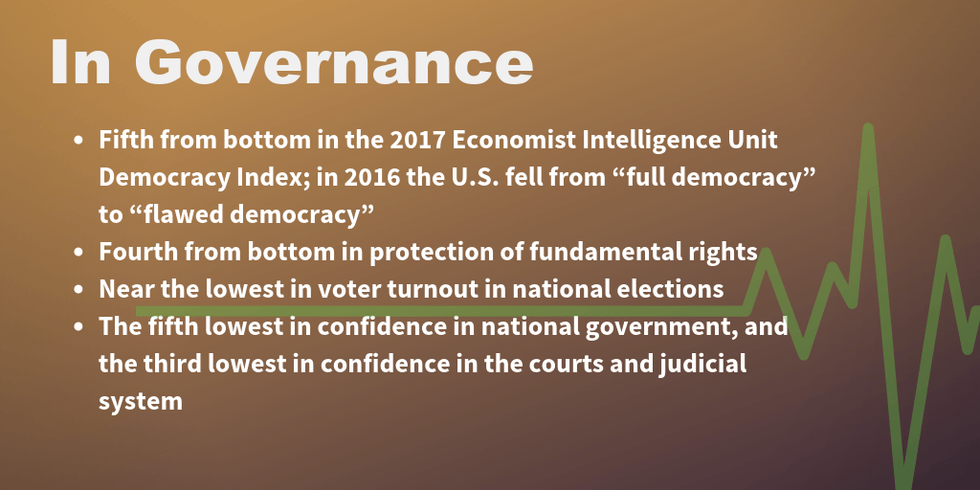
References:
In International Affairs
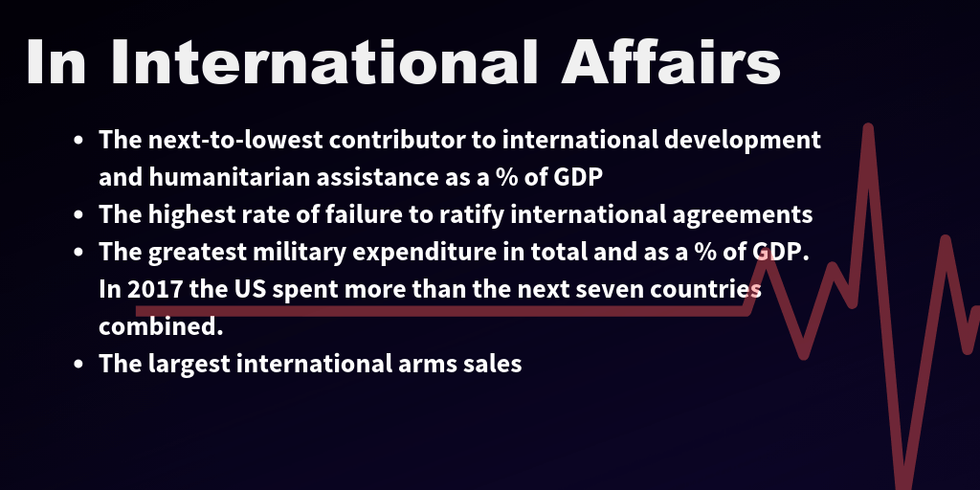
References:
Sarah Baehr and Conor Ploeger, both associated with the Vermont Law School, assisted with the research and preparation of these data sets.
In 2015, 21 young people sued the U.S. government for promoting the fossil fuel industry even when it was aware of the dangers of climate change. In Juliana v. United States, the youths accused the government of endangering their future well-being thereby violating the government's public trust responsibility and their constitutional rights.
The U.S. government has repeatedly tried to stop this case from moving to trial. Courts, including the U.S. Supreme Court, have denied or refused to rule on government challenges. The case is currently before the U.S. Ninth Circuit Court of Appeals on yet another motion to dismiss.
The suit centers on whether the government actively promoted the use of fossil fuels despite being aware of evidence that such action endangered the future of the planet. The youths, represented by the nonprofit Our Children's Trust, retained experts to contribute supporting reports for the suit, including from environmental lawyer and climate policy expert James Gustave Speth. He reviewed what each administration from Carter to Trump knew about climate change and alternative energy and what actions were taken. Speth concluded in his report, which was filed in 2018, that every administration "continued full-throttle support for the development and use of fossil fuels." This pattern is "the greatest dereliction of civic responsibility in the history of the Republic," he wrote.
Speth's advocacy for alternative energy pathways spans four decades. Under President Jimmy Carter, he headed the U.S. Council on Environmental Quality, which recommended pursuing renewable energy and energy conservation as means to reduce the threat of climate change. He is a founder of the Natural Resource Defense Council and the World Resources Institute and served as administrator of the United Nations Development Programme. He is currently a senior fellow at the Vermont Law School, the Democracy Collaborative, and the Tellus Institute, and a former dean of the Yale School of Forestry and Environmental Studies.
This interview has been condensed and edited for clarity.
Fran Korten: The U.S. government seems very intent not only on winning the youths' lawsuit, but also on the trial not moving forward at all.
Gus Speth: The whole strategy of the government now for three years has been to prevent the trial from happening. I think they don't want the spotlight put on all this information or on the threats to the well-being of this new generation, which is going to absorb all the shock of our neglect. It is important that the lawsuit is brought by young people, because it really makes everyone face the reality of the challenge. I just hope and pray that the case gets to trial. I think it will be a landmark in public education. And it could lead to a decision that would really galvanize action.
Korten: As you reviewed four decades of government knowledge and action on climate change, what did you conclude?
Speth: Every administration I looked at did a great deal to promote the continued use of fossil fuels at a very high level. No president has looked at that fossil fuel use curve and said, "You know, we have got to bend it down and get out of this business." The percentage of U.S. energy that fossil fuels provides only went from about 90 percent with Carter to about 80 percent today.
Korten: You led the U.S. Council on Environmental Quality under Carter. Many of us remember Carter advocating turning down the heat and wearing sweaters. And he put solar panels on the White House. Do you feel Carter was personally convinced of the dangers of climate change way back in the late 1970s?
Speth: I think he believed that the federal government had to assert itself as a leader in energy policy and energy directions. He felt he had to reduce oil imports, which had skyrocketed in the period before him. That led to a whole series of actions to promote alternatives to imported oil, including greater use of domestic coal. But he repeated over and over that the long-term solution depended on developing renewable energy. He championed our Council on Environmental Quality report about what the U.S could do on solar and other renewables. And he set a national goal for the year 2000 of 20 percent of energy coming from renewables. He deeply believed in an energy future that was primarily one of renewable energy resources with a sharp increase in energy efficiency and conservation.
I know from speaking with him personally and from his public remarks that he understood the risks of climate change.
Korten: Let's turn to Reagan. What happened to concern about renewables and climate change when Reagan came in?
Speth: Well, there really were two Reagans in this era. One was the initial Reagan, in which he had a very antienvironmental crew--James Watt at the Interior Department and Anne Gorsuch at EPA, among them.
The country was not crazy then, and there were good Republicans as well as good Democrats. People like John Chafee, a great Republican senator from Rhode Island. They pushed for the appointment of credible people--Bill Ruckelshaus at EPA and then his successor, Lee Thomas. Throughout much of the later Reagan administration, EPA and others put out numerous reports on the seriousness of the climate issue. Really good reports. The Department of Energy had a strong research program on it.
But Reagan didn't pay any attention to them. His administration just went full bore for more fossils fuels. The '80s were also the time when we first had compelling scientific evidence linking the theory of global warming to changes actually happening on Earth. This was brought forth in the testimony of [NASA scientist] James Hansen in 1982, 1986, and 1988. Three times he went to the Hill and testified, each time with more alarm that the Earth was changing due to the carbon dioxide buildup.
Korten: When did serious government opposition to action on climate change develop?
Speth: The opposition began to form during President George Herbert Walker Bush's administration. It didn't have to be too overt at that time, but it was very successful. It had top people within the White House who ensured that almost everything Bill Reilly at EPA would try to do on this issue would get squelched. Around this time, Exxon began its shift away from being a source of credible information on climate to supporting climate change denial, as documented by InsideClimate News in its report The Road Not Taken.
Korten: And when did climate change become so divisive in the broad public?
Speth: Ironically, an important shift occurred during the Clinton-Gore administration. They came in with a determination to make the issue a public concern. Al Gore had been a leader on climate. The polling suggests that their efforts tended to increase Democratic support slightly but that Republican voter support for climate action went in exactly the opposite direction. The Democrats and the Republicans diverged further, and that increased over time, driven by several factors, including a well-funded disinformation campaign taken from the tobacco playbook.
Behind all this is ideological opposition to government action, the great power of the fossil fuel industry, and America's vast economic insecurity.
Korten: What president do you feel did the most to act on climate?
Speth. I think Obama did the most. His policymakers were developing regulations about methane that Trump quickly axed. They had a clean power plan that Trump's been trying to get rid of. They put in fairly aggressive fuel economy standards for automobiles. But even if you add up the things that Obama was doing toward the end of his administration, they still would do less than the cap-and-trade plan that passed the U.S. House in the early years of his administration but failed to pass in the Senate.
Meanwhile, the Obama administration was rigorously promoting fossil fuels.
Korten: Writing your report for the young people's lawsuit forced you to reimmerse yourself in years of data about the increasing urgency of climate change accompanied by very little action. How was it emotionally for you to review all of that history of missed chances?
Speth: It was a very hard thing to deal with. I have said to people that this is the saddest story ever told, because the consequences are so huge and so long-lasting and so devastating. And we knew what we should have done. There were people in every administration who knew that what they were doing was wrong. So it made me sad, and it made me mad. It was also sobering in the sense that the climate activists had tried, we really tried.
Thousands and thousands of the smartest people in our country have pushed hard for 40 years, and to see so little actually accomplished is disturbing. We're up against the huge power of the fossil fuel industry; the extraordinary ideological opposition to the federal government doing anything important; money going into disinformation campaigns that people readily bought into. And it's still going on.
It is a sure sign in my view that we need to change the system of political economy in which we are struggling. It's sobering, as I say. But not discouraging, because we're still fighting.
Korten: Where do you think we are now on this issue in terms of public sentiment?
Speth: I actually believe that in terms of public awareness and getting something moving finally, we may have turned a corner.
It's going to be a hard slog. But with all the events that have brought public awareness forward--fires and floods and much more--and the number of cities and governors who are now acting, something has changed within the past year or two. Progressive momentum on the issue has begun. But it has a long way to go. We are in such a hole and have so much power arrayed against action. There's still so much misunderstanding and manipulated denialism.
Korten: What do you think ordinary citizens can do to help address climate change?
Speth: The important thing is for people to redouble their efforts. Now that we've got a fighting chance, we really have to fight.
We all should be engaged with a Green New Deal. I think one reason the idea is getting so much attention is that it is not just about climate and the environment. They are seeing the connections with other issues--the need to deal with impacted communities and create a huge new jobs programs and have a major infusion of finance into renewables and efficiencies and all kinds of retrofits. Bringing these issues together has created some real momentum.
Among other things, Green New Deal proponents see no problem with the government having the capacity to spend money into the economy to get these things done--quantitative easing for the planet, not just for the big banks. Lord knows where it's all going to go. Opposition is already building.
Above all, to deal with the climate issue, we need a powerful movement of movements. And we need to get a lot more "in the streets" about it--a fusion of progressive forces that is activist and rambunctious and full of spunk and determination.